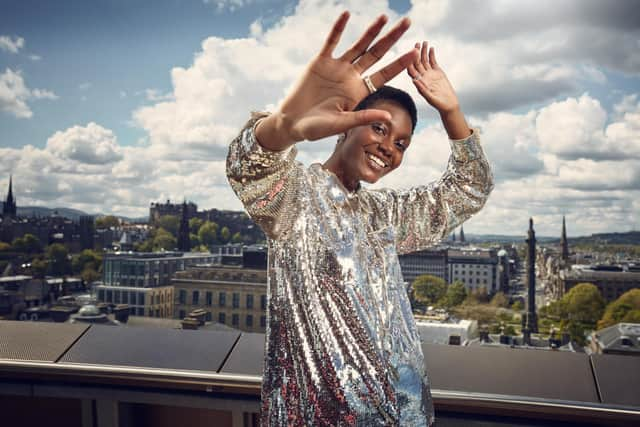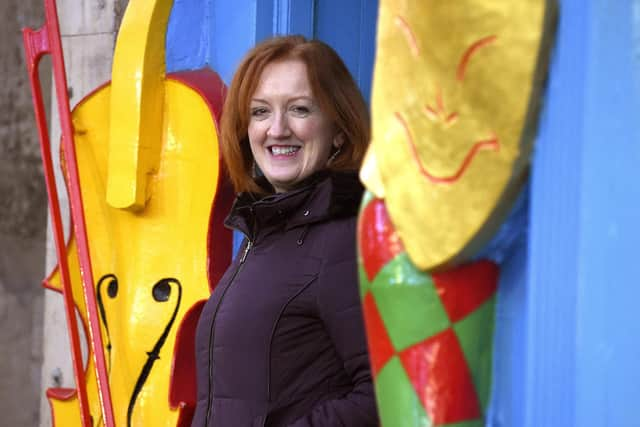Edinburgh Festival Fringe hits back at 'cultural snobbery' attacks on the event
Shona McCarthy, chief executive of the Fringe Society, which oversees the event, has hit back at attempts by the Cockburn Association to block the return of a major outdoor venue this year and suggestions that its recovery should not be supported due to its impact on the city before the pandemic.
The Cockburn has been running a social media campaign encouraging its supporters to object to plans to revive a circus “big top” on a site on the Meadows where Fringe shows have been stage for than 20 years.
Advertisement
Hide AdAdvertisement
Hide AdThe group has suggested that the venue will “privatise” part of the Meadows with a “commercial event with gated access”.
However the Cockburn Association has supported plans for the Edinburgh International Festival to stage most of its shows outdoors on three temporary sites this summer.
A new blog on the Cockburn’s website by chair Cliff Hague said the growth of cultural events since the launch of the Edinburgh International Festival had “splurged out to embrace stand-up comedy show and circuses”. It was published amid huge uncertainty over what form Edinburgh’s festivals will take this summer.
Mr Hague wrote: “Edinburgh attracts residents and visitors not primarily for its circuses and gigs, but because of its economic base in finance and public service, and its outstanding landscapes, public spaces and physical environments.”
In an exclusive interview, Ms McCarthy said: “I just don't understand where this language that is creeping in all the time about commercial operators is coming from. It’s almost like doing business has become a dirty word.


“I’ve spent 30 years working in the cultural sector and have continually heard governments encouraging the sector to be more business-like and take an approach that is about ticket sales and earning a living and not be relying on public subsidy.
“The Fringe is a festival that largely does that and washes its own face. The word commercial seems to imply that is somehow tainted or a dirty thing.
Advertisement
Hide AdAdvertisement
Hide Ad“People forget that it is not a funded festival. I don’t know how many times I have spoken about the model at the Fringe, where everybody comes and takes their own risks on it.
"My big concern is that I don't think anybody has yet woken up to the fact that this festival is really under threat at the moment. Most of the organisations that make up the Fringe are sitting on huge debts at the moment.


“I don’t see how paying to go to see the ballet or an opera is any different to paying to see a comedian? There is a real danger of a cultural snobbery here.
"The Fringe is a real access point for people to experience culture. There are some people who may never dream of going into a concert hall but would absolutely walk around and watch street performers at the Fringe and find real joy in that.
"There are some people who may be into opera but they love comedy. The idea that anybody could object to street performance or circus when it just brings joy to people is just baffling.
"Comedy was pretty much invented in this city. The roots of the transfer of comedy from stand-up to screen were established at the Fringe.
“You can hardly turn on the radio without hearing someone talking about their first start at the Fringe. When you hear someone like Phoebe Waller-Bridge talk about the Fringe it gives you an enormous sense of pride that someone who is now a global superstar had their starting point in it."
Advertisement
Hide AdAdvertisement
Hide AdIn an official objection to Underbelly’s Circus Hub venue, the Cockburn has told the council that allowing an “exclusive, enclosed event space to go ahead” would go against the spirit of an 1827 law preventing any new building from happening.
Ms McCarthy added: “Fringe operators are deeply sensitive to what is happening in their wider world. I haven’t come across a single venue operator or company who wants to either put the public at risk or what have been the lungs for local communities through the Covid experience.
"I think we’ve proved over the last few years in particular that the Fringe has the vast majority of local residents as its audience. Sometimes you could be forgiven for forgetting that. The Fringe is very much rooted in Edinburgh, is very much of the city and very much appeals to a real mix of people.”
In his latest blog post, Mr Hague writes: “For the past two decades, Edinburgh has been manufactured as a place providing the biggest and best summer and winter event experiences. It is a finite space, with limited infrastructure.
"It is a space for temporary hire, with a particular premium extracted because of that, and especially for sites that monopolise spectacle or proximity to it. It is the biggest companies that can afford the prime spaces. Hence the ‘Big Five’ have come to dominate the Fringe – Underbelly, Gilded Balloon, the Pleasance, the Assembly Rooms and the University of Edinburgh, who own half of all Fringe venues. This all has consequences.
"The growth imperatives embedded in tourism and festivals strategies and practices mean that potentially infinite demand meets finite space and infrastructure. The resolution is a search for new spaces that can generate and funnel money.
“There are also negative spill-overs from that same intensive exploitation of those advantages; collateral damage. In recent years these have included overcrowding and congestion; excess litter; restrictions on movement by, and even displacement, of residents; high noise and nuisance levels; and periods when non-paying members of the public were excluded from their parks and open spaces, which in turn were damaged environmentally by the duration and intensity of use for live events and paid amusements."
A message from the Editor:
Thank you for reading this article. We're more reliant on your support than ever as the shift in consumer habits brought about by coronavirus impacts our advertisers.
If you haven't already, please consider supporting our trusted, fact-checked journalism by taking out a digital subscription.
Neil McIntosh
Editor
Comments
Want to join the conversation? Please or to comment on this article.
